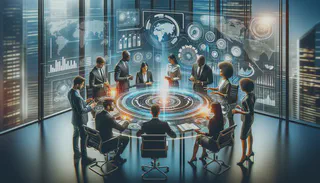Human Capital is the Main Asset for Innovation and Digital Transformation

That was the title of the session I joined at the 2021 Inclusive Innovation Conference (IIC) organized by the Philippine Department of Trade and Industry. The IIC aims to “discuss and track changes and progress in the country’s innovation and entrepreneurship ecosystem and seek to harmonize strategies towards new goalposts that can further elevate the country’s innovation and competitiveness.”
I thought I’d share some of my thoughts on the questions raised in the session.
As the Philippines is slowly advancing towards Industry 4.0, specifically towards the age of robotics, advanced manufacturing, and artificial intelligence (AI) technology, how would these developments, particularly AI, affect the future of the Philippine industries?
In the medium term, I see two general things happening to the industries in the context of the fourth industrial revolution. Either they survive and thrive, or they get disrupted and die. On the bright side, we will also see increased yield and productivity in the agriculture, manufacturing, and services sectors. There will be improvements in both products and processes offered by enterprises. Fear-mongers would be talking about the destruction of the labor market; I don’t believe in this. Yes, there will be fundamental changes, but I see this as an evolution rather than destruction. In fact, we can expect more availability for higher-skilled occupations since technologies will be replacing most routine-driven tasks. To wit, in a WEF report, it’s communicated that about 97M jobs globally could be created with the help of tech advances; in contrast, about 85M could be displaced. These numbers indicate that we can expect a net positive change.
How do we ensure that our workforce will have a place in the future of production?
Although we expect net positive change, the shift still leads to a significant talent gap. And this is the not so bright side. To ensure the workforce would have a place in the future of production, the government must implement a multi-pronged approach as outlined in the Philippine National AI Roadmap. (1) We need to transform our education system and its offerings. Academic curricula need to be revised promptly, focusing not just on a checklist of courses/subjects to offer but also on the quality of what’s being offered, the teachers, and the trainers. And this has been said several times already, but Government and Academia must find a way to work harmoniously with the Industry.
We have a good case at the Asian Institute of Management’s MSc in Data Science program (MSDS). The program is innovative and agile in that every year the program deliberately engages enterprises, government agencies, and international organizations in academic exercises. As a result, students experience how it is to work with external entities and potential employers. At the same time, the latter signals to the program their needs, which, in turn, allows MSDS to adjust its curriculum design and ensure that students are job-ready even before graduating. (2) We need to incentivize our industries to offer Learning & Development programs to help their employees upskill and reskill. Programs that improve everyone’s digital or data literacy are imperative. I must also highlight the usefulness of executive education. Enterprise leadership must understand the Fourth Industrial Revolution, what it entails, and what it could mean for their products and processes. This way, the return on investment on L&D programs is clear; and thus, organizations could adequately support these initiatives. And (3), we should continue to employ a more data-driven approach to the skills gap problem in the Philippines by correctly identifying and mapping jobs vulnerable to Industry 4.0. We must embark on an inventory of skills and competencies needed in the future to respond to the changing demands of organizations and society appropriately. This must be done contextually, tailored to fit the Philippine setting.
What are the necessary skills to be developed as early as today?
Ultimately, more than specific hard skills, we must fortify our foundational and essential skills: literacy, numeracy, digital or ICT, and even financial literacy and entrepreneurship. In addition, we need to instill in our young ones a growth mindset and the importance of learning how to learn. Lastly, we must also develop critical thinking, problem-solving, and analytical thinking skills, so we’re not always playing catch up with the accelerating change around us.